Jan 11, 2016
The legendary musician and showman David Bowie was as mutable and enigmatic about his religious views as he was about his music, art and gender-bending fashion choices.
Yet his death from cancer Jan. 10 at 69 brought tributes from religious leaders who knew talent when they saw it, and perhaps recognized that Bowie’s crossover style would inevitably touch the ineffable as he constantly looked for meaning — and novelty.
Read the Full Article

Already a subscriber? Login
